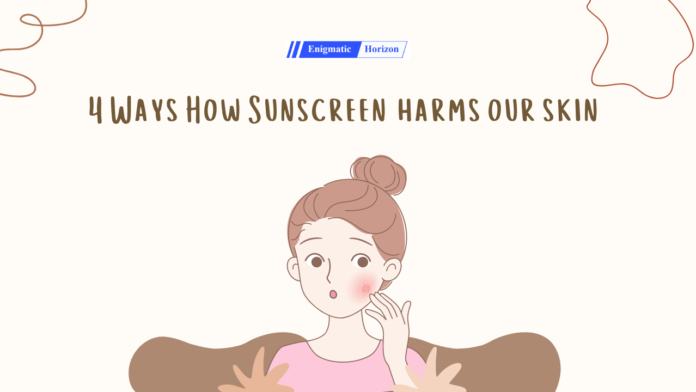Enigmatic Horizon Staff
Every day, we come across numerous advertisements and infomercials about sunscreen and its benefits. But have we ever pondered how sunscreen adversely affects our skin? But before that, we need to understand what sunscreen is and what its uses are.
Ultraviolet light is one of the components of sunlight that has a lower wavelength than the visual range of a human and is invisible. UV light is of two types: UVA and UVB. Humans need protection and shielding from both types, which is ideally where sunscreen comes into action. When sunscreen protects us from UVA and UVB rays, it is known as a broad-spectrum sunscreen. But most of the chemically made sunscreen brands dissolve in any oil base, which aggravates acne and allergies and makes the skin dull and dry. Here we shall discuss four ways that sunscreen affects our skin negatively:
Pigmentation, discoloration, and sunburn: Using chemically infused sunscreen with an SPF lower than 30 results in cosmetic allergies and painful pigmentation, which includes fading of skin color.
Early signs of skin aging in youth: Overuse of sunscreen for indoor workers or people who are not exposed to direct sunlight can create an oily layer on the skin, making it sweatier and causing skin irritation and rashes. One can opt for other alternatives such as the use of a scarf or any other light fabric while traveling, a moisturizer for better radiance, and home remedies such as coconut oil, shea butter, and aloe vera for protection from UV rays.
Skin Cancer: While the web is bombarded with a lot of skin care products, sunscreen has been one of the most sought-after skin regimes for ages. Many skincare brands use benzene as an ingredient in sunscreen and after-sun care products. Researchers state that any detectable levels of benzene up to 2 parts per million are a matter of grave concern and could result in skin cancer. Chemical benzene is found naturally in crude oil, cigarette smoke, and gasses. Hence, there is always a need to check the ingredient list before making a purchase. Lotion-based sunscreen and foam infused sunscreen are some of the better alternatives to include in your skincare routine.
Incorrect Usage of Sunscreen: Most of the youth today are exposed to the internet, which at times misleads us as to how to use a particular product. Speaking about sunscreen, Dermatologists often recommend an ideal amount of SPF 30 and a broad spectrum (both UV A and UV B) sunscreen. If you do use sunscreen, SPF 50 to 60 is preferred. 0.04 ounces of sunscreen are ideal for the face, which is equivalent to a dollop the size of a small coin. For the entire body, it is recommended to take 1 ounce of the cream, which is equivalent to covering the entire palm with sunscreen. Ideally, sunscreen should be reapplied every 2 hours.
So, make sure to keep a check on your sunscreen, before you decide to apply it to your skin!
